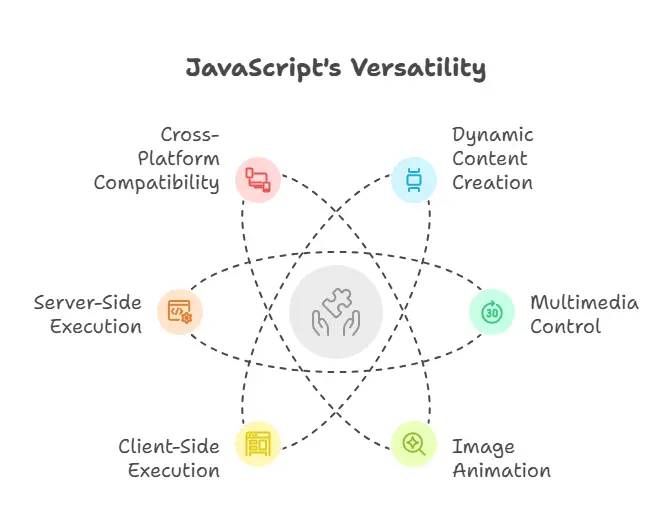What is Javascript ?
JavaScript is everywhere. From adding life to websites with animations and interactive elements to building full-scale applications and even powering servers, JavaScript is the unsung hero of the digital world. Its flexibility, versatility, and sheer ubiquity make it one of the most sought-after programming languages today. But what makes JavaScript so special? Let’s uncover the magic!
Javascript

- Dynamic Web Experiences: JavaScript transforms static web pages into engaging, interactive platforms, enabling features like animations, pop-ups, and instant feedback.
- Universal Compatibility: It’s supported by all major web browsers, meaning you can write once and run anywhere.
- Versatility Beyond the Browser: With frameworks like Node.js, JavaScript extends beyond the browser to power servers, build mobile apps, and even control IoT devices.
- Rich Ecosystem: Its vast library ecosystem allows developers to solve complex problems efficiently, from UI design to data processing.
- Constant Evolution: JavaScript evolves rapidly with modern standards, keeping it relevant and powerful in a fast-changing tech world.
- Beginner-Friendly Yet Powerful: Whether you’re a novice programmer or an experienced developer, JavaScript offers a smooth learning curve and room for mastery.
History of JavaScript
- The Birth (1995): JavaScript was created by Brendan Eich in just 10 days while working at Netscape. It was initially called “Mocha,” then “LiveScript,” before finally being named “JavaScript” to ride the wave of Java’s popularity.
- Standardization (1997): JavaScript was standardized by ECMA International, leading to the ECMAScript specification that defines the core language.
- The Rise of Frameworks (2000s): Libraries like jQuery simplified JavaScript, making it more accessible for developers.
- Modern Era (2010s): The emergence of powerful frameworks like React, Angular, and Vue revolutionized how developers build applications, establishing JavaScript as a full-stack language with Node.js.
Features of JavaScript
- Lightweight and Interpreted: Runs directly in the browser without requiring compilation.
- Dynamic Typing: Variables can hold different types at runtime, offering flexibility.
- Event-Driven Programming: Responds to user actions like clicks and keypresses seamlessly.
- Prototypal Inheritance: Objects can inherit directly from other objects, simplifying code reuse.
- Asynchronous Processing: Handles tasks like API calls and file reading without blocking execution using promises, async/await, and callbacks.
- Cross-Platform Compatibility: Runs in any modern browser and even outside the browser with tools like Node.js.
Advantages of JavaScript
- Runs Directly in the Browser: No additional setup required for basic scripting; just a browser is enough.
- Fast Execution: JavaScript executes directly in the browser’s engine, ensuring rapid performance.
- Extensive Community Support: A vast ecosystem of libraries, frameworks, and active developers makes it easier to find solutions and resources.
- Versatile Applications: From web development to server-side programming, mobile apps, and game development, JavaScript does it all.
- Interactive Capabilities: Enables dynamic content like animations, sliders, and real-time form validation.
Disadvantages of JavaScript
- Browser Dependency: Different browsers may interpret JavaScript slightly differently, leading to potential compatibility issues.
- Security Concerns: JavaScript is often exploited for malicious purposes like cross-site scripting (XSS).
- Loose Typing: While flexible, this can lead to unexpected behavior and debugging challenges.
- Performance Limitations: For resource-intensive tasks, JavaScript may not be as fast as languages like C++ or Java.
Ready to dive deeper into the world of JavaScript? Let’s begin the journey and unlock its full potential !💡
JavaScript is a revolutionary language that has shaped the web as we know it. With its rich history, powerful features, and widespread use, it remains an indispensable tool for developers. While it has its challenges, the advantages far outweigh them, making JavaScript a must-learn language for anyone aspiring to build modern, interactive applications. Happy coding !❤️
